Sector-specific Cash and Voucher Assistance
CVA can help people in crises address their needs within a specific humanitarian sector, such as water, food, health, shelter, livelihood, or protection. Sector-specific CVA can be restricted or unrestricted, and conditional or unconditional, and will typically be provided as part of a comprehensive package which may also include in-kind and service-based assistance.
Each sector has to consider different questions, challenges, advantages and risks when it comes to supporting people’s recovery within their area of expertise. This requires evidence, tools, guidance and capacity. Meeting sector-specific outcomes through CVA also requires a multi-sectoral understanding of needs and of household economic security – see Multipurpose Cash Assistance. While some sectors are very experienced in implementing CVA and have done so for many years, others are now catching up. Most humanitarian sectors are committed and have been increasing their efforts on sector-specific CVA. The Global Cluster Coordination Group (GCCG) is also coordinating cross-cluster work to improve the sectoral used of CVA.
Current priorities
The CALP Network works closely with the cash technical groups/task teams within the global clusters, who have been defining their 2020 priorities and workplans during their regular meetings. A general overview and specific details of these priorities across each global cluster is available here.
Sector-specific CVA subpages
Camp Coordination, Camp Management and Cash and Voucher Assistance
Page
Find out more about Camp Coordination and Camp Management (CCCM) in relation to Cash and Voucher Assistance (CVA). For the most up to date information visit the Global CCCM Cluster’s website.
Education and Cash and Voucher Assistance
Page
A brief introduction as to how Cash and Voucher Assistance (CVA) can support education outcomes. For the most up to date information please visit the Global Education Cluster’s website.
Food Security and Cash and Voucher Assistance
Page
A brief introduction as to how Cash and Voucher Assistance (CVA) can support food security outcomes. For the most up to date information please visit the Food Security Cluster Cash and Market Working Group web page.
Health and Cash and Voucher Assistance
Page
The content on this webpage has been developed with the Global Health Cluster.
Nutrition and Cash and Voucher Assistance
Page
Malnutrition continues to pose a major challenge to human well-being around the world. In 2020, an estimated 144 million children under five suffer from stunting (i.e. chronic malnutrition) , 47 million children under five were wasted (i.e. acute malnutrition) , of which 14.3 million were severely wasted, and an additional 340 million suffered from micronutrient deficiencies (UNICEF/WHO/WB...
Protection and Cash and Voucher Assistance
Page
How can Cash and Voucher Assistance (CVA) support protection outcomes? Please find a brief summary below, and for the very latest information, refer to the Global Protection Cluster Task Team on Cash for Protection.
Shelter and Cash and Voucher Assistance
Page
How can Cash and Voucher Assistance (CVA) support shelter outcomes? Please find a brief summary below, and for the very latest information, refer to the Shelter and Cash Working Group.
WASH and Cash and Voucher Assistance
Page
How can Cash and Voucher Assistance (CVA) support WASH outcomes? Please find a brief summary below, and for the very latest information, refer to the WASH Cluster’s Cash and Markets Technical Working Group.
Latest

The Politics of Cash: A Case Study on Humanitarian Cash Transfers in Ukraine
Report
This case study examines the evolution of cash transfers in the humanitarian response in Ukraine. The use of cash transfers in Ukraine brought out the best and worst aspects of the international humanitarian system. Uncertainty over where cash fits into the humanitarian architecture – and whether...

Rapid Assessment for Markets: Bidibidi Refugee Settlement
Report
The Rapid Assessment of Markets (RAM) conducted within the Bidibidi Refugee Settlement and in the surrounding Ugandan towns and trading centres sheds some light upon the rapidly developing network of marketplaces within one of the world’s fastest growing refugee settlements. The RAM highligthed key...
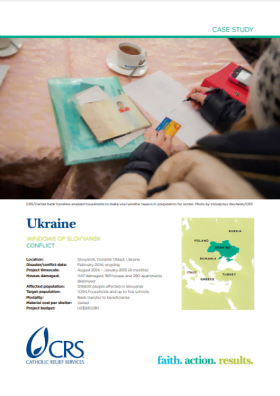
Using Cash for Shelter: Windows of Slovyansk
Case Study
After pro-Russian separatists declared republics in Eastern Ukraine in April 2014, Slovyansk became a focal point of fighting between government forces and rebels until the Ukrainian military retook the city in early July. Slovyansk saw the heaviest fighting of any urban area and many city dwellers fled....

Scaling Up Humanitarian Cash Transfers in Nepal
Case Study
The Nepal earthquake has a number of lessons for the global debates on scaling up cash both at the level of cash responses themselves and in the more transformational way envisaged by the High Level Panel through which cash can disrupt the established humanitarian system. Humanitarian cash transfers after...
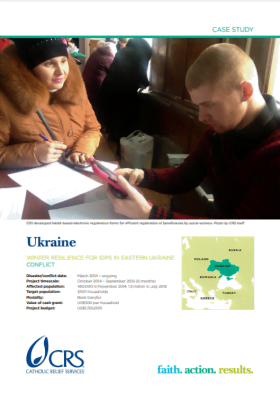
Using Cash for Shelter: Winter Resilience for IDPs in Eastern Ukraine
Case Study
Continued conflict in Eastern Ukraine during 2014 caused internal displacement of over 1.46 million people by September 2015, and another 1,123,800 fled to other countries, according to the United Nations High Commissioner for Refugees. Rapid assessments carried out by Catholic Relief Services found that...

Baseline Assessment for Education Cash Transfer Programming for IDPS in Dahuk Governance
Report
REACH, in collaboration with UNICEF, conducted a Baseline Assessment of Access to Education among Internally Displaced Persons in the Dahuk Governorate of Iraq. This assessment aimed to improve the efficiency of humanitarian cash assistance by implementing partners for increased access to education in the...

Using Cash for Shelter: Rent Assistance for Syrian Refugees
Case Study
Over 600,000 Syrian refugees have arrived in Jordan since 2011; 80 percent of these live in urban or peri-urban locations rather than in camp settings. Families in this situation must pay rent for their shelter, and are therefore subject to shifts in rental market values. Rents have inflated substantially...
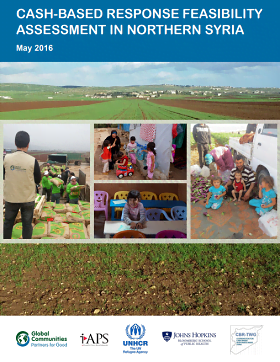
Cash-based Response Feasibility Assessment in Northern Syria
Case Study
As the conflict in Syria extends beyond the fourth year, there is need for a widespread humanitarian response focused on urban areas that addresses humanitarian needs and promotes resilience for the 13.5 million people in need of protection and humanitarian assistance within Syria. The majority of...
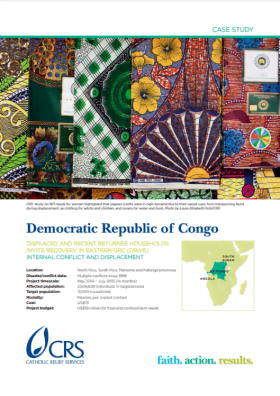
Using Cash for Shelter: Displaced and Recent Returnee Households Invite Recovery in Eastern DRC (DRIVE) Internal Conflict and Displacement
Case Study
The Democratic Republic of Congo, or DRC, has endured multiple conflicts since 1996, including armed conflict in Eastern DRC in 2012 and 2013. In December 2014, the United Nations Office for the Coordination of Humanitarian Affairs in the DRC reported that the armed conflict had internally displaced 2.72...
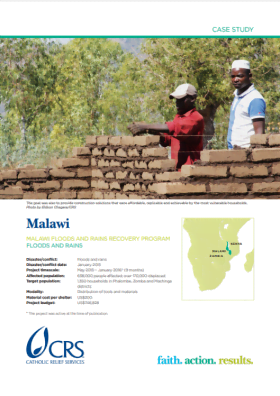
Using Cash for Shelter: Malawi Floods and Rains Recovery Program
Case Study
In January 2015, heavy rainstorms and floods affected 630,000 people in Malawi. Protracted immersion or flow of water damaged or destroyed dwellings and displaced over 170,000 people, with timber and roofing material also lost to the floods. Catholic Relief Services conducted a physical survey of...

The Impact of Earned and Windfall Cash Transfers on Livelihoods and Conservation in Sierra Leone
Report
This study by Bulte et al. measures the impact of a cash transfer programme aimed at alleviating poverty and reducing pressure on the natural environment in Sierra Leone. Researchers offered aid to 91 rural communities, which are dependent on slash-and-burn agriculture in three forms: as windfall...

DFID Shock-Responsive Social Protection Systems research: Literature review
Report
DFID has commissioned research into Shock-Responsive Social Protection systems, to further understand the nature of the interaction between social protection, humanitarian and disaster risk management systems and ways in which long-term social protection systems can be scaled up to
provide support in...

IOM Cash-Based Transfer – Update and Case Studies
Report
Cash-based transfers have a long history in the support of people on the move. Cash or vouchers have been an element of the International Organization for Migration’s resettlement support for people moving to new countries, or returning to countries they had to leave. Increasingly over the last decade,...
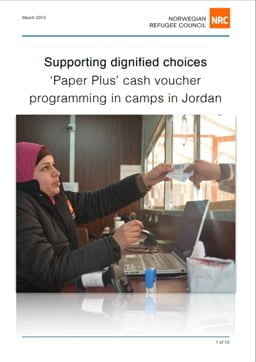
Supporting Dignified Choices ‘Paper Plus’ Cash Voucher Programming in Camps in Jordan
Report
The Norwegian Refugee Council (NRC) in Jordan has directly assisted close to 400,000 vulnerable Syrian refugees in both formal camps and host communities since it began operations in November 2012. NRC is the lead partner of UNHCR in Zaatari and Azraq camps in providing refugees with shelter and the...
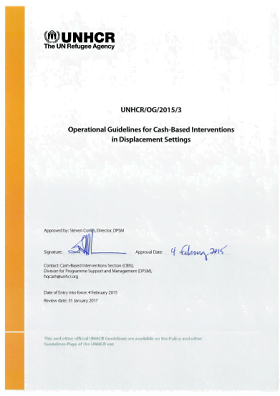
Operational Guidelines for Cash-Based Interventions in Displacement Settings
Guidelines and Tools
These operational guidelines support UNHCR and partner staff to determine if and when cash-based interventions (CBIs) are appropriate to meet the needs of refugees and other persons of concern and aids the design and implementation of effective programmes. It focuses on the needs of refugees, but can...
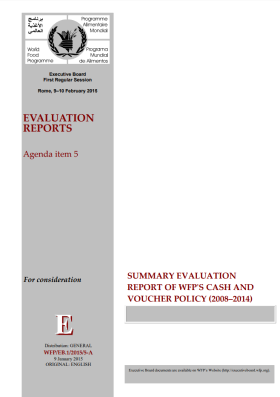
Summary Evaluation Report of WFP’s Cash and Voucher Policy (2008-2014)
Report
The WFP’s Summary Evaluation Report on cash and voucher policy (2008-2014) was commissioned by WFP’s Office of Evaluation in order to assess the quality and results of the policy and its implementation. The evaluation found that although the policy does not represent WFP’s current best...

A Review of Evidence of Humanitarian Cash Transfer Programming in Urban Areas
Report
Urban poor populations frequently experience disasters of varying typology and intensity. When set against a backdrop of poverty and marginalisation, their needs can be complex. As recent urban crises have pushed humanitarian agencies to respond in urban areas, this literature review examines the...

Exploring Food Assistance Programmes: Evidence for Lebanon
Report
The purpose of this study is to analyse how markets in Lebanon have responded to the increased demand from the Syrian refugees. More specifically, the study focuses on the micro-level impacts of market-based food assistance on the market supply chains and market performance. It explores the pros and cons...

Research on Food Assistance for Nutritional Impact (REFANI): Literature review
Report
The REFANI literature review identifies existing evidence on the use of Cash Transfer Programmes (CTPs) and the impact of CTPs on acute malnutrition in humanitarian contexts. The review is structured as follows: Section A discusses the global burden of acute malnutrition; Section B highlights...
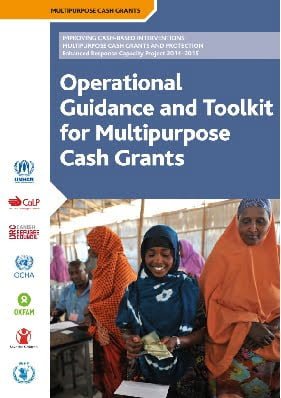
Operational Guidance and Toolkit for Multipurpose Cash Grants
Guidelines and Tools
This operational guidance and toolkit brings together worldwide expertise on cash-based interventions (CBIs). It provides comprehensive and practical guidance for humanitarian actors to assess the feasibility, conceptualise the design and structure the implementation of MPGs. The guidance focuses on...